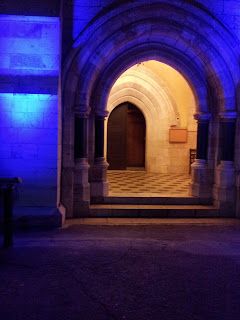Woke not at all sure what to do. Watched the sun rise.
Such was the intensity of yesterday that it's hard to imagine sight-seeing and churches. Sit at breakfast with fellow pilgrims at Ecce Homo convent. Breakfast is not spectacular: instant coffee, toast and pitta bread. Cubed cheese (possibly Feta, tomatoes and black olives). A man sitting opposite me at the table introduces himself: he advises the US military on Islamic matters. He is wearing a wooden cross outside his shirt. Someone asks him about Islamic pilgrimage. He says that social pressure is involved: the community puts pressure on people to make pilgrimages.
Converstaion with Diego from Padua. Diego is doing research on pilgrims. He asks if I have mastered the internet connection yet. I say that the problem arises with the different log ins - EH Guests, Coffee House etc. It's just a question of working it out. He says 'I've written a book about that. It's called Women and Computers'.
Look at this? It's a recorder. I'm recording everything you say. I really hope not.
Thinking a lot about Palestine and related issues. Sign on to a three-hour political tour of the Old City. This is mostly a lecture by someone who I am sure is an academic in real life such is his range of knowledge. He is Jewish. Some of his grandparents came from Russia. His intonation, inflections and accent even remind me of an old Jewish friend, who fled the Soviet Union. He is intense and very focussed - impassioned. He wears
rope sandals and a checked shirt. There is a gingham trim inside his collar.
We start - what a coincidence - at the cafe near Damas Gate where I had the pumbkin dish. The owner is washing down the terrace. He is the only Christian owner in the quarter: this is a Muslim quarter. His family has lived here for many decades, he says.
Key points from the guide (three hours of talking in all so cannot possibly summarise): the things he said that stick in my mind....
- growing nationalist movements in Russia and Eastern Europe from the mid 19th century onwards led to anti-semitisim and an exodus of Jews
- Palestine at this time was part of the Ottoman Empire
- The British conquered the Ottoman Empire in 1917 (T E Lawrence led the Arab revolt which preceded this)
- The Balfour Declaration was a watershed moment and could be said to be the document that held the seeds of the political problems that now exist in the region. Lord Balfour (Foreign Secretary) viewed a national home for Jews, without infringing on the rights of the non-Jewish population. Seven per cent of the population i.e. Palestine under British mandate was Jewish.
How on earth did this come about? What could the British have envisaged under the Balfour Declaration (not entirely happy about being referred to as ' you the British' by our intense tutor: Colonialism is rape and pillage and murder.)
- The British were under pressure and wanted to leave Palestine.
- The 1929 Stock Market crash in the US led to a clamp-down on immigration there
- The British found themselves pressed between two demands i.e. Zionists v Arabs
- 1936 was the Arab rebellion. The British used Jewish forces to repress the rebellion
- 1947 - the UN partition plan with Jewish and Arab states
However... the Jewish population was urban. Migrants always go to cities - not the country. They buy property in cities, not land. The cities were 50:50 Jewish and Muslim.
The British withdrew in November 1947 and let us say the next day the civil war began. In 1948 Arab states started to send in troops. It became a war of attrition.
The population of Palestine was 1.3 million: 750,000 people became refugees as they were driven out of the current Israel. Some Palestinian citizens of Israel remained, but most of those people were internally displaced.
Gaza became a huge complex of refugee camps.
This idea of parcelling up territory was mirrored in other places as the British Empire was broken up e.g. India and Pakistan.
Fast forward to the six-day war in 1967: (the guide has already been talking for more than an hour.)
Israel conquered the West Bank but there was not much movement of population. Israel couldn't find a way to leave the West Bank or exit. The First Intifada forced Israel to reposition the Oslo accords.
The Second Intifada was against Palestinian leadership as much as against the Israeli government.
The Palestinian authorities were completely corrupt, says the guide. The area is aid depdenent. 'Your taxes go towards paying the salaries of aid workers." Money is also channelled towards Palestinians working closely with the NGOs.
"Nothing like a Palestinian state is being built."
Takes notes of what strikes me: will need to return to reflect on this and read much, much more.
 A walk uphill through crowds from the convent to Damascus Gate.
A walk uphill through crowds from the convent to Damascus Gate.

























































